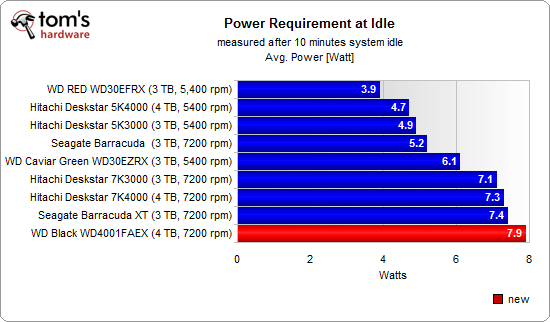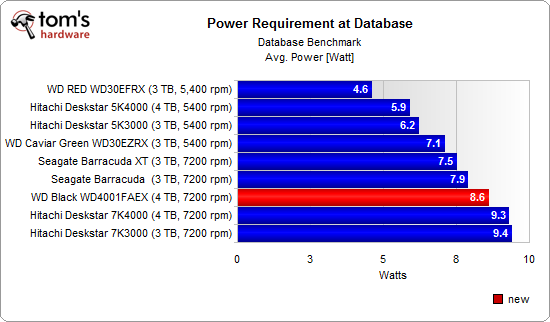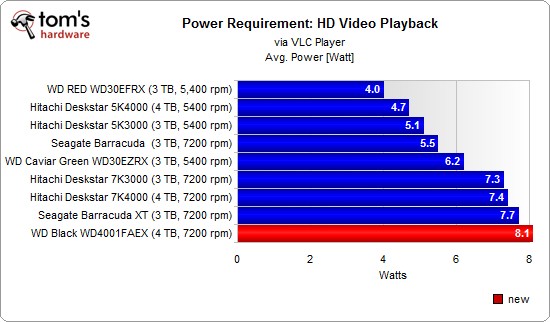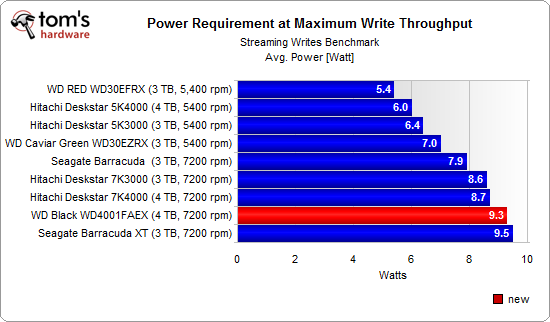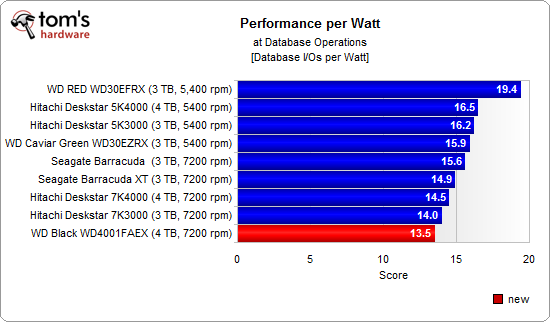Western Digital's 4 TB WD4001FAEX Review: Back In Black
Western Digital has a new 4 TB flagship. Its WD4001FAEX is part of the company’s Black family of performance-oriented drives. Spinning at 7,200 RPM, it might seem at home in a high-end desktop, but our numbers suggest it might fare better in a server.
Temperatures And Power Consumption
The 4 TB Black drive brings up the rear when it comes to measuring temperatures, posting 41 degrees Celsius and tying Hitachi's Deskstar 7K4000 as the warmest disk in our line-up. Then again, 41 degrees is still acceptable, particularly in a desktop machine with plenty of airflow.
In contrast, though, Western Digital's WD30EFRX (from the Red family) manages a frosty 31 degrees, which is why it's marketed as the right drive for network-attached storage appliances, which are usually loaded with other drives also generating heat.
If you're looking specifically for low power consumption, then the WD4001FAEX is certainly not the way to go. Western Digital doesn't even try to hide the fact that its five-platter 7,200 RPM flagship is a bit of a power hog. The company's data sheet lists an idle power number of 8.1 W, which is actually worse than the 7.9 W we recorded.
The 4 TB Black model shows us 8.1 W of power use during HD video playback and 9.3 W during a maximum write speed benchmark, doing nothing to redeem the high idle consumption result.
As a result, when we look at performance per watt, Western Digital's new 4 TB monster falls to the bottom of our chart.
Get Tom's Hardware's best news and in-depth reviews, straight to your inbox.
Current page: Temperatures And Power Consumption
Prev Page Benchmark Results: PCMark Application Performance Next Page Western Digital's WD4001FAEX: Probably Not For Home Use-
joytech22 ReplySo, who should buy Western Digital's WD4001FAEX? The company says its drive is meant for PC enthusiasts and professionals. But we can’t quite agree because Seagate's Barracuda is, quite simply, faster.
For enthusiasts, all we really want is space and lots of it. We fill it up fast, but we don't do anything super-intensive requiring a constant of 80+Mb/s over long durations.
For enthusiasts that do a lot of video editing using lots of tracks, sure it's a bit of a limitation but so is any one drive solution.
As for professionals, it just depends what they need it for.
A high-end workstation needing plenty of storage and speed just needs a RAID config containing a few of these babies. Or super-expensive high capacity SSD's...
All in all, I'm just saying it depends on your situation but generally you find people are happy with big drives regardless of speed (since all drives perform admirably nowdays anyway). -
mayankleoboy1 One thing i have never found a answer to : Is it worth defragmenting HDD's on modern systems, with Win7 and NTFS ?Reply
I do defragment my HDD, but subjectively i find no difference. And i have yet to find objective data. -
alidan mayankleoboy1One thing i have never found a answer to : Is it worth defragmenting HDD's on modern systems, with Win7 and NTFS ?I do defragment my HDD, but subjectively i find no difference. And i have yet to find objective data.Reply
it really depends.
if you dont have a boot specific drive, than defragmenting is kind of important.
if you do... than it doesn't tank system performance to not defrag.
really what kills a hdd performance is being a a boot drive and storage, as it can get so slammed with access that it drags the over all performance to sub mb levels.
what hurts a hdd on storage when its not a boot, is filling the damn thing up to the last mb.
generally, if you have a hdd and have enough space to defrag it without the program complaining (15-25% of the space remaining) you dont need to defrag. it helps, but you wont see the gains that you otherwise may see if you didnt have the space to defrag. -
avjguy2362 Before SSD's I used to use a 75 GB raptor and used O&O's defrag COMPLETE method on the OS and it made a substantial difference. O&O has multiple types of defrag: a quick version, a standard version and a "Complete" version that takes a long time because it moves the data to the other end of the drive and then puts all the files back in the order that they would most likely be read. It's unnecessary for data drives, but for the OS it made a big difference.Reply -
Chocolate? Since this about 4TB of storage, at first i thought i was looking at picture of a work out video for the hard drive junky, 10 condoms, WD happy mascot, and a rubber keychain all part of a harmless joke by WD.Reply
-
_Pez_ I prefer storage over extreme speed of SSD.Reply
Nice Review I liked more the hitachi perfomance, also those are better than the WDs' HDD I think WD is getting left behind about perfomance numbers, now I see in this review that the strong ones are Seagate and Hitachi.
My main PC has 14TB of storage; 4 seagate 3tb 2&2 in RAID 0, 2 seagate 1TB RAID 0 for OS, all of those are the newely Seagate models of 1TB per platter.
I do not see the need to spent on SSDs while there's the chance to get lots of storage and decent speeds, except for 4Kb transfers. -
Luay Seagate Barracuda 3TB is on three (1TBx3) platters so why not WD?Reply
Another issue I dislike about the WD Caviar blacks is the noise they make. How much does this update improve on this issue? -
abbadon_34 Not sure why WD is being secretive about the number of platters, it's always been standard info and I can't see a reason not to. It's nice to see 5 years warranties back, and not confined to enterprise or Raptor series. While nothing to exciting, it's nice to see a good solid hardware review.Reply -
hytecgowthaman 80mb per sec Ok how many hours to fill the hdd.Reply
5Year warranty is ok but we need data recovery warranty because (4tb) hdd fails no way to get the files.
so always use another 4tb for back up use.
another thing is how many hours take to recovery the files.

